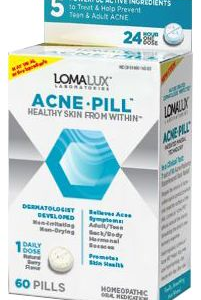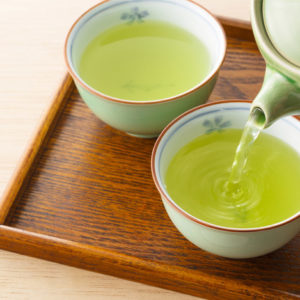Why Adult Hormonal Acne is So Hard to Treat & What You Can Do About It
| 17Jan2018
Unless your hormonal acne is very mild, traditional over the counter acne treatment preparations won’t work. Typically adult acne takes the form of lesions that develop deep under the skin and stay just under the skin where topical treatments can’t penetrate. These cystic acne lesions are large “bumps” under the skin, are tender to the touch, and are inflamed and hurt. Additionally, adult skin is thinner and more sensitive to harsh topical acne preparations.
If you have adult acne, you are not alone, as it affects up to 55 percent of adults between the ages of 20 and 40, and can even affect people well into their 50s.
Adult acne is more likely to appear around the mouth and jawline.
Here’s a look at common causes of adult acne, along with treatments that can help you achieve clearer, healthier-looking skin.
What Causes Adult Acne?
Adult acne is most commonly caused by hormonal fluctuations and imbalances. Women tend to get adult acne more often than men, since women go through a higher number of hormonal fluctuations as part of normal life. Menstruation, birth control pills, pregnancy, and menopause are common causes of hormonal acne in women.
Other common causes of adult acne:
- Stress. Stress causes your body to increase cortisol levels, which in turn increases oil production and skin inflammation — leading to acne.
- Medications. Acne is a common side effect of some medications, while medications that interfere with the body’s hormone levels can also indirectly trigger acne.
- Poor nutrition. Foods that are high in fat, sugar, refined carbs, and hormones can all have adverse effects on the body’s hormone production and cause adult acne.
Adult acne can also be caused by external factors such as wearing sweaty gym clothes for an extended period of time, or using makeup and other beauty products that clog pores. But in most cases, adult acne is triggered by factors that upset the body’s natural hormonal balance.
Why Adult Acne is Difficult to Treat
While puberty is often the most common culprit behind acne in teenagers, adults usually suffer acne for entirely different reasons. Adult acne can be difficult to treat as traditional topical acne preparations won’t work, as they fail to address and treat the root internal cause, and they won’t prevent future breakouts.
Adult acne is often characterized by large, red, cystic bumps that cannot be as easily treated as most whiteheads and blackheads. Adult acne can be painful, unsightly, and difficult to cope with. Fortunately, there are many effective treatments for adult and hormonal acne that can help you achieve clear skin.
Some people affected with adult acne also show signs of rosacea, redness and inflammation that is usually located in the T zone area. Most topical acne preparations only aggravate the redness and irritation.
Effective Treatments for Hormonal Acne
The safest, most effective ways to treat hormonal acne involve treating this skin condition from the inside out. Since adult acne is mainly triggered by hormonal imbalances, treatments should revolve around changing certain lifestyle habits that interfere with your hormones.
Here are some of the most effective ways to treat hormonal acne:

Eat healthy, whole foods
- Learn how to manage and relieve stress. Make gradual changes to your lifestyle as needed to reduce stress and eliminate stressors. Manage stress via exercise or learning relaxation techniques such as deep breathing and yoga.
- Eat healthy, whole foods. While the exact science between diet and acne hasn’t been fully established, there is some data to show that anti-inflammatory foods can be beneficial for acne. Manage your acne using foods like fruits, vegetables, whole grains, nuts, seeds, and fish — all of which are loaded with nutrients and antioxidants that help rebalance your hormones. Also, Omega 3 fatty acids may also decrease skin inflammation. Omega 3 fatty acids are available via foods and as a supplement. Consider limiting sugar and refined carbs, such as white bread and pasta.

Loma Lux Acne Pill
- Take Loma Lux Acne Pill. This dermatologist-developed formula contains 5 powerful skin clearing mineral ingredients that are taken like a vitamin to treat and clear adult acne from the inside out. As it works internally, it does not irritate adult skin like topical acne solutions. Also, when taken regularly, it actually helps prevent recurrences.
- Get more sleep. Lack of sleep causes stress and offsets the body’s natural hormonal balance — triggering hormonal acne. Start going to bed earlier and improve your sleep environment to ensure you get quality sleep on a nightly basis.
- Avoid irritating skincare products – find skin care products that don’t irritate your skin. Read the labels and packaging on all skincare products to confirm they lack ingredients that can clog pores and trigger acne. Stick to beauty products labeled “oil-free,” and avoid ingredients like parabens, dyes, and perfumes. Avoid products with scrubbing particles that can further irritate the skin.
- Do not pick or squeeze – it causes more damage to the skin and can cause additional scaring. Also, adult skin doesn’t heal as well as younger skin, so there is a greater risk for acne scarring and secondary bacterial infections. No scar can ever be completely erased, but a dermatologist can help minimize scarring.

Green tea & water – for a holistic approach, try a few cups of green tea daily
- Green tea & water – for a holistic approach, try a few cups of green tea daily. The active ingredients in green tea have been found to be anti-inflammatory. Be sure to drink 6 – 8 glasses of water daily to keep your skin hydrated.
- If all else fails – see a dermatologist/physician who can rule out an underlying medicine condition before prescribing prescription oral medications.

Loma Lux Acne Pill can be taken once per day to clear acne and relieve acne and rosacea symptoms in teenagers and adults. Visit our website to learn more about how Loma Lux Acne Pill treats rosacea and acne from the inside out to help you achieve healthier, clearer skin.
